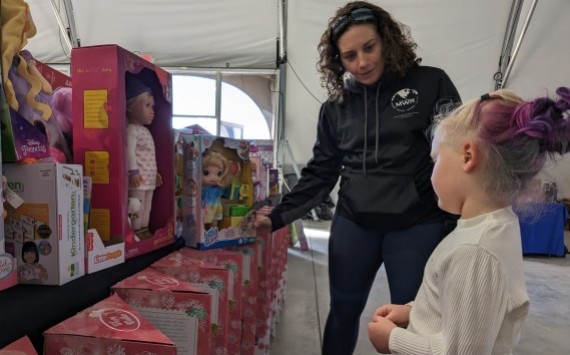Weed Army Community Hospital at Fort Irwin, Calif., began vaccinating healthcare workers and staff with the COVID-19 vaccine Dec. 23, 2020, in line with Department of Defense’s population schema.
According to the schema, healthcare providers, healthcare support, emergency services & public safety personnel who have chosen to receive the COVID-19 vaccine will be vaccinated first.
Capt. Jessica Oesch, a perioperative nurse in the Weed ACH operating room, received the first COVID-19 vaccine at Fort Irwin.
For Oesch, an Anniston, Ala., native, getting the vaccine was a means of protection.
“I chose to get the vaccine not only to protect myself, but to protect patients from me because I don’t want to be somebody who’s asymptomatic and spreading the virus unknowingly to the people I’m caring for and my family as well,” Oesch said.
Oesch said she hoped to encourage others to get the vaccine.
“I think if I’m going to be such an advocate for the vaccine, I should lead by example,” she said. “I can’t expect anybody to do anything that I’m not personally willing to do, and I think this is a great example of that.”
Col. Nancy Parson, the Weed ACH commander, said she was “very proud” of everyone who volunteered to get the COVID-19 vaccine.
“The healthcare workers want to show everyone that the vaccine is safe and highly recommended,” she said. “I appreciate the healthcare workers who want to make a difference in protecting themselves and their patients.”
Staff who receive the vaccine will continue to wear appropriate masks, practice physical distancing, wash hands, and follow restriction of movement to protect the safety of the community as a large portion of the population will need to be vaccinated before COVID-19 risks diminish.
“Protective measures, such as wearing a mask, washing hands, and maintaining social distancing, will still be very important until all Americans are able to receive the vaccine and the United States has seen a reduction in COVID-19 positive cases,” Parson explained. “It is still critically important for everyone to adhere to [Centers for Disease Control and Prevention] guidelines for preventing the spread of COVID-19.”
Oesch said she too believes continued safety precautions are important.
“The vaccine is effective, but you still don’t want to pass anything along to anybody else,” she said. “I think safety for everyone is still most important until [the CDC and DOD] let us know the restrictions have been loosened.”
Prior to the vaccine’s arrival, Weed ACH staff received training and guidance on how to receive, store, and administer the vaccine.
Those who receive the vaccine are slated to receive the second dose of the vaccine in 28 days.
According to the Food and Drug Administration’s Moderna COVID-19 vaccine website, “The most commonly reported side effects, which typically lasted several days, were pain at the injection site, tiredness, headache, muscle pain, chills, joint pain, swollen lymph nodes in the same arm as the injection, nausea and vomiting, and fever.”
Oesch said she encourages anyone who is interested in receiving the vaccine to read the fact sheets provided by the vaccine manufacturers and offered one final piece of advice.
“Get vaccinated!” she exclaimed.
For more information about the Department of Defense’s COVID-19 response, visit health.mil/coronavirus.












